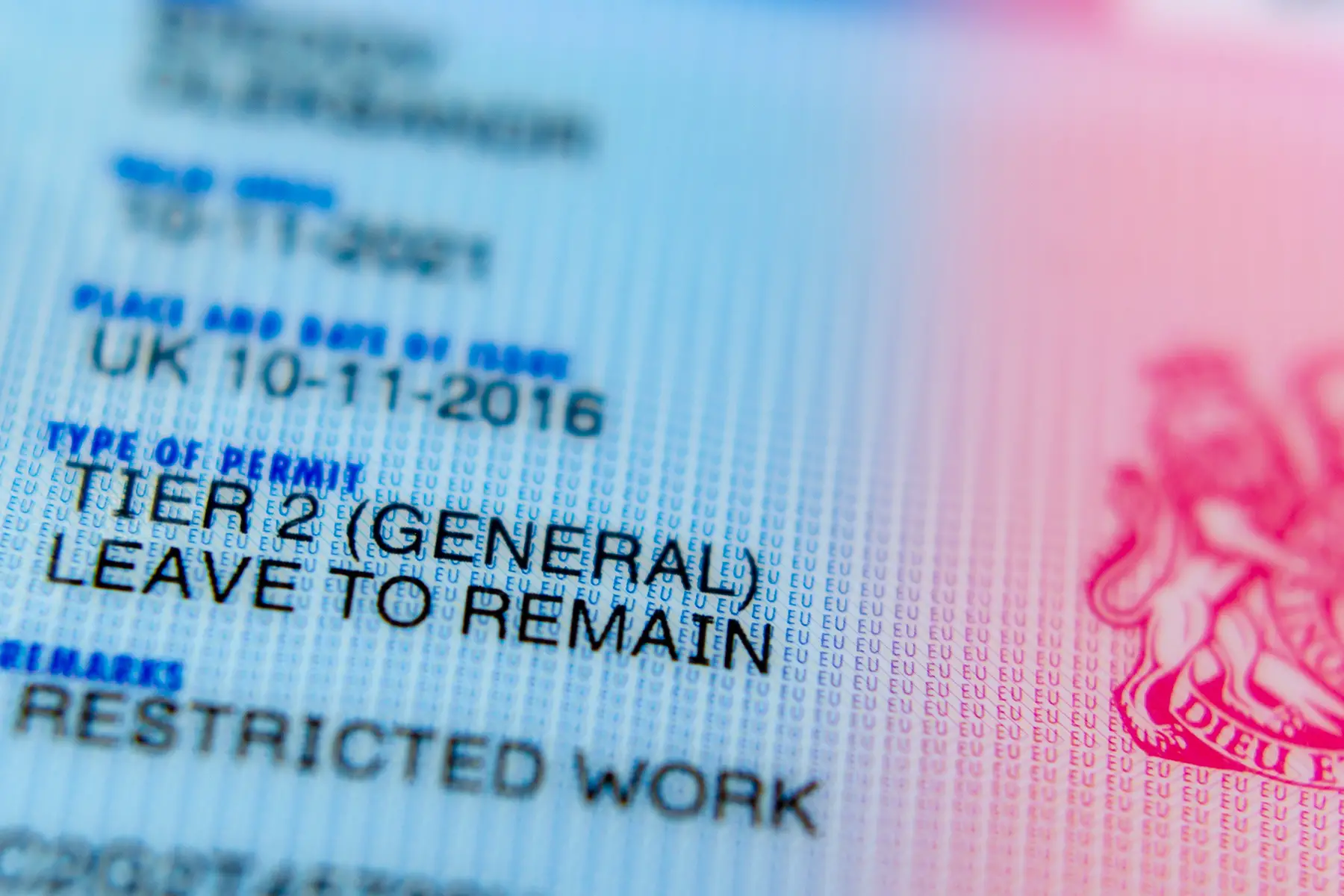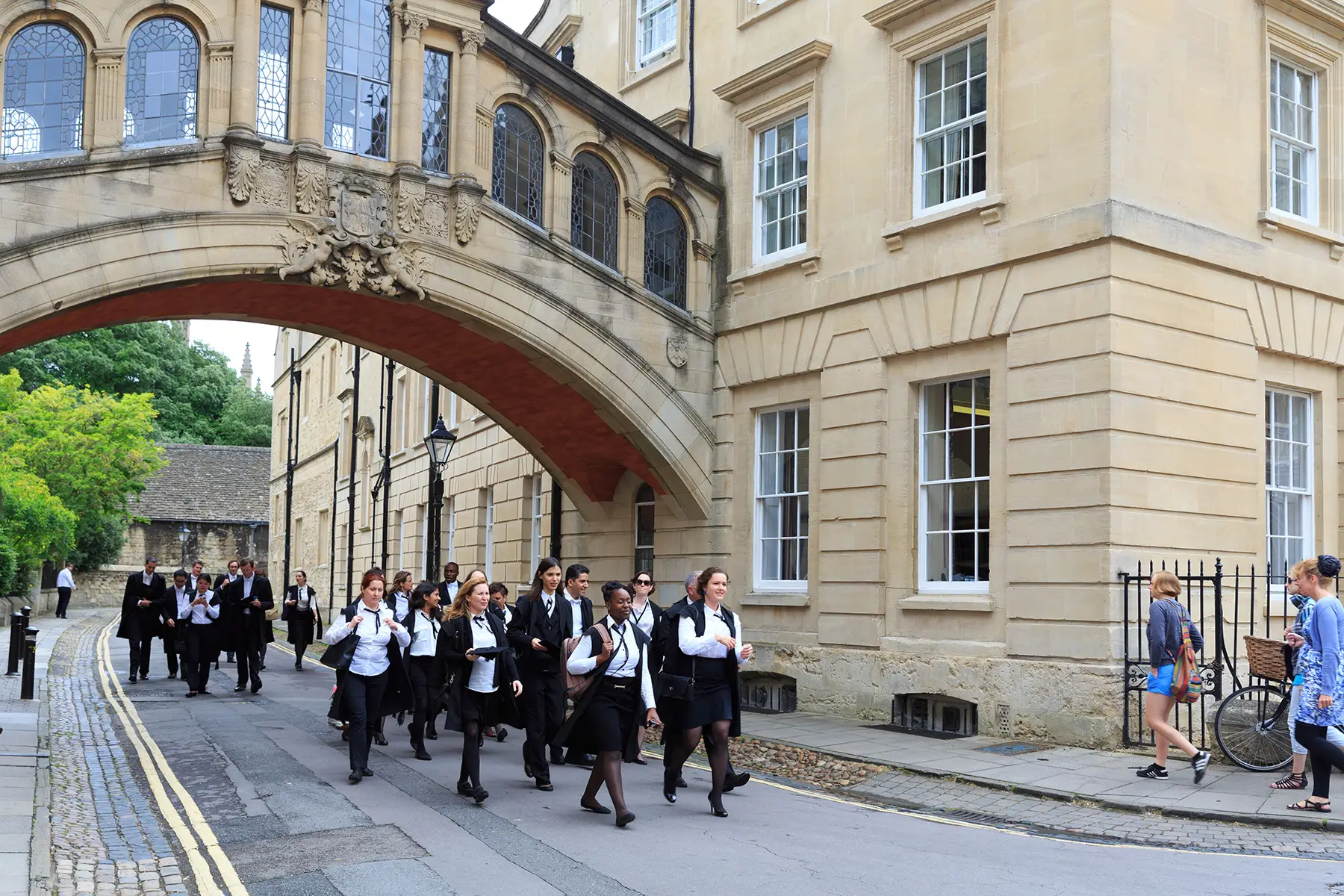The UK job market continues to welcome workers from overseas. However, to give yourself the best chance of finding rewarding and satisfying employment, you will need to tailor your CV and cover letter to meet the expectations of British employers. Of course, you will also want to ensure that you make a great first impression when attending job interviews in the country.
So, to help you get off on the right foot, this article includes the following information:
CV-Library
Looking for great work opportunities in the UK? Register your CV on CV-library, one of the UK’s largest online job boards. Get instant job alerts or search online to find roles across all industries and locations. Whatever your sector, you’ll find exciting new roles on CV-Library.
Applying for a job in the UK: what to expect
The UK job market
According to the Office for National Statistics (ONS), the number of workforce jobs reached a record high of 36.2 million in September 2022. This represents an increase of 541,000 jobs from December 2019. Needless to say, workers are in high demand in the UK. This is particularly the case in the fields of healthcare and social work, hospitality, transport, and real estate. Unsurprisingly, economic growth is concentrated in London. Indeed, the capital saw the largest increase in jobs (89,000) of any region in the UK between March and June 2022.
How to find jobs in the UK
So how can you find jobs in the UK? Fortunately for expats, there are numerous recruitment agencies, job portals such as CV-Library, and online networks that advertise job vacancies throughout the country. You can read more about this in our article on Finding jobs in the UK.

The UK Government’s National Careers Service website also provides information about the different ways to search for jobs across the country. This includes its ‘Find a job’ search tool. Of course, you can also find jobs advertised in local and national newspapers, trade magazines, and online journals.
Almost all UK job vacancies will be advertised in English. That said, in some parts of the country, they will be duplicated in Welsh, Urdu, Arabic, or other ethnic languages that are spoken by significant numbers of local residents.
The level of detail in a job advertisement may vary depending on the sector and the seniority of the role. That said, it should normally include the following:
- Job title
- Company background
- Job type
- Job description and responsibilities
- Qualifications and experience needed
- Perks and benefits
- How to apply
- Contact information
- Deadline for applications
How to apply for jobs in the UK
The advertisement should advise you on how to apply for the position. According to the National Careers Service, nowadays, most job applications are made online, with the applicant providing the information requested in a form supplied by the company or organization. It is important to answer all of the questions and to use English unless you are specifically instructed to use another language.
The form will typically ask for some personal information, such as your National Insurance Number and work visa details along with your educational qualifications and work history. It may also ask you to provide details of professional and personal referees. You can include additional information about your background and achievements by sending your UK CV along with a cover letter that highlights your suitability for the role.
After submitting your application, you may only hear back from the employer if you have secured an interview. However, it is good to bear in mind that this may take several weeks, depending on the level of interest in the role and how quickly the employer needs to fill the vacancy. If you don’t hear anything within a week after the deadline for applications, you can call or email to ask when they will be compiling their shortlist of applicants for interview. They may invite you to attend an interview by phone or email.
Writing a UK CV
Whatever country you move to in the world, making sure that you tailor your CV to meet the standards and expectations of the local job market is crucial when it comes to landing an interview. And if you happen to be searching for jobs in the UK, these guidelines will help you adapt your CV for the UK.
UK CV structure
Your CV – or what is more commonly known as a ‘resume’ in the US, Canada, and Australia – is your chance to promote yourself to an employer and land a job interview.
Because you will be applying for jobs in the UK, you should write your CV in British English. It should fill no more than two sides of A4, and you should present the information with headings, bullet points, and sufficient spacing to make it clear and easy to read. It is also best to use a clear font such as Ariel, Times New Roman, or Calibri consistently throughout your UK CV.
The core of your CV should focus on your educational and employment background. You can also include information about your hobbies and interests if they are relevant to the job you are applying for.
What to include in your UK CV
Your UK CV should outline the following information in the order presented:
- Personal information: This should include your name, address, phone number, and email address at the top. Details such as your age or marital status are not required (like in some other countries) and there is no need to include a photo of yourself unless specifically requested by an employer.
- Personal profile: Begin your CV with a one-paragraph summary of your skills, aspirations, and career goals. This is basically an opportunity for you to show what you can offer an employer and shine above other candidates.
- Education: List your educational achievements in reverse chronological order, with the most recent one first. Again, try to highlight those which apply directly to the job.
- Employment history: Provide information on all relevant work experience and outline your key responsibilities and achievements for each position in a small paragraph or list of bullet points that are easy to read. Make sure you include the name of the employer, their location, your job title, and the dates that you were employed.
- Related interests (optional): Although it is not compulsory, some people include a section on their hobbies and interests outside of work. This helps to show their personality and can often provide a good talking point in interviews. If you choose to include this on your CV, try to cover interests that relate to the position you are applying for.
Notably, you may also want to include details of two or three professional referees at the end of your CV, especially if the job advertisement requests them.
Tailoring your CV
Naturally, you should use the CV style that best matches the role you are applying for and make sure that you tailor it to the specific job description. For instance, those applying for roles in the IT and engineering sectors will want to keep their CV technical. Those in the digital arts, on the other hand, might opt for a slightly more creative format that demonstrates their job-related skills and personality. They might also choose to highlight their skills by incorporating links to videos or an online portfolio.

As mentioned above, unlike in some countries, UK CVs generally don’t include a photo of the applicant. In fact, many recruitment agencies across the country actually advise against this, as some employers might immediately disregard applications with images to avoid potential discrimination allegations.
Similarly, the National Careers Service recommends not including the following details about yourself as they are – or at least, should be – irrelevant to your chances of securing a job in the UK:
- Date of birth
- Nationality
- Marital status
- Appearance
- Race
- Age
UK CV templates
Fortunately for job seekers in the UK, there are numerous free UK CV templates and resume checkers that allow you to polish your resume and tailor it for the local job market. Some of the most popular ones include TopCV and Resume.io.
The UK Government also provides tips on how to write a UK CV on its National Career Service website and hosts free workshops throughout the country. These allow job seekers to learn how to write an effective UK CV and practice their interview techniques with professional career advisors.
Of course, it goes without saying that it is still important to double-check your spelling and grammar before submitting your UK CV to a potential employer.
Cover letters in the UK
It is standard to send a cover letter along with your UK CV when applying for a job in the country. Essentially, a cover letter gives you the opportunity to demonstrate how your qualifications, experience, skills, and training make you the ideal candidate for the role you are applying for. Of course, it also allows you to show that you are enthusiastic about the position.
The letter should include around three to five paragraphs. You should begin by introducing yourself and mentioning the job title and reference number you are applying for. As you go on to explain why you are a good match for the role, it is wise to include details that show you have thoroughly researched the company and its target markets.

You should then end the letter by thanking the reader for taking the time to consider your application. You can also mention that they will find all your essential details in your CV and that you are looking forward to hearing from them.
If your application is digital, you can send the cover letter as an email. However, if you are posting your application, you can print the cover letter and send it with your CV. As with CVs, it is possible to find online examples of well-presented cover letters to use as a guide.
Phrases and accented letters
Language is important, so it’s a good idea to make sure that you use the correct phrases and terminology when writing your cover letter. For example, if you know the name and title of the person you are writing to, you should address them at the start of the letter and end it with ‘Yours sincerely’. If, on the other hand, you are unsure of the recipient, you should start the letter with ‘Dear Sir or Madam’ and finish it with ‘Yours faithfully’.
Job interviews in the UK
What to expect in a UK job interview
If you are shortlisted for the job for which you have applied, the next stage in the process is likely to be a formal interview. The format of the interview will differ depending on the type of job, the size of the organization, and the seniority of the position you have applied for. It might be in-person at the employer’s premises, by phone, or via video link.

For highly coveted positions with a large number of candidates, the initial interview may be only the start of a process that leads to a second interview or a series of assessments including presentations, team exercises, and psychometric tests. On the other hand, if the company is small and the job is less prestigious, the interview could be with a single person and take less than an hour.
Your potential employer will most likely outline in advance what to expect, giving you ample opportunity to prepare. The National Careers Service website offers some great tips on how to make the best impression. The UK’s biggest graduate careers website, Prospects, also provides an excellent guide to preparing for the various interview formats used by British employers.
Dress code and appearance for UK job interviews
While there are no hard and fast rules when it comes to the format of job interviews in the UK, it is safe to assume that you will be expected to be on time and well-presented. You should also be polite and courteous, and act in a professional manner.
Although dress codes at work have generally become more relaxed in the UK in recent years, it is better to be too smart than too casual. Smart business attire should be suitable for the majority of companies, even those in the creative sector with a more relaxed attitude. Therefore, make sure your clothes are clean and ironed, your shoes are polished (trainers are best avoided), and you smell fresh.
It is also advisable to cover any tattoos and piercings and not to flash too much flesh. Remember, your aim is to convince the interviewer that, whatever the workplace’s prevailing business culture is, you will have no trouble fitting in.

If you are on a tight budget and in need of a smart suit for your interview, there are several places to look. For instance, the London-based charity Suited & Booted provides smart business clothing for interviews to men on a low income, while Dress for Success supplies professional clothes, styling, and interview advice to disadvantaged women. It may be possible to find similar services at charity shops in other towns and cities too by searching online.
Questions to expect in a UK job interview
The organization you have applied to may have information on its website about its recruitment process and what you are likely to face at your interview. If not, it is essential to prepare ahead of time and be ready for the most likely questions.
Once again the nature of the employer and the seniority of the position you are seeking will influence the process. Questions are likely to be framed to assess your competency for the job and may cover your past experience. You can also expect to be quizzed about your strengths and your job-related knowledge.
Employers may also seek to test how you might react to typical work-related scenarios, how decisive you are, how you prefer to solve problems, and how you work with others. They may also steer questions towards revealing your values and motivation as well as your attitude to flexibility.
The most common interview questions
While you can never be certain what you will be asked, you can anticipate some of the most likely questions, such as:
- Can you tell me a bit about yourself?
- Why do you want to work here?
- What are your strengths?
- What are your weaknesses?
- How do you prioritize your work?
- What has been your greatest achievement?
- How would you improve our products or service?
- What are your goals?
- When would you be available to start the job?
Notably, recruitment agencies can also help you prepare answers to these common questions and use them as an opportunity to appear confident and sure-footed. For instance, you will find some excellent advice online on sites such as Prospects and indeed.
It is best not to make your answers appear too scripted, and each response should be no longer than five minutes. Along the way, make sure you take every opportunity to list your skills, experience, and successes and tailor each answer to the research you have done about the company. And try to be honest and assertive throughout the interview.
Questions to ask in a UK job interview
Toward the end of the interview, you will typically have the opportunity to ask your own questions. This is normal in the UK and you should use it to show your interest in the employer and your enthusiasm for the role you have applied for.
Good questions you can prepare in advance include:
- Can you describe the role as you see it?
- Will there be opportunities for training and progression?
- What are your plans for the company?
- Can you tell me more about the team I’ll be working with?
- What’s the best thing about working here?
Importantly, you should never ask a question that makes it appear that you don’t understand what the company or organization does. Moreover, you should avoid asking about things like holidays, benefits, the length of the lunch break, and sick pay. Once again, there is plenty of online advice from specialists about potential pitfalls and how to avoid them.
When to discuss salary and benefits
For many jobs in the UK, the recruiting company usually publishes the rates of pay and benefits when the job is advertised and the matter won’t be up for discussion. However, more senior positions are often advertised with a pay band, which is usually dependent on age and experience. This is sometimes negotiable if you are offered the job. That said, there may be times when the matter of remuneration is not formally raised until the interview stage.

There are no hard and fast rules on talking about money during an interview. Therefore, it might be best to wait until you have been offered the job – or the interview has gone extremely well – before you broach the subject.
Ideally, you should go into a job interview having realistic salary expectations based on your knowledge and experience and the company concerned. You might also want to use a salary checker to get an idea of what you should be earning. The potential employer might also pre-empt matters by asking what you are looking for. At this point, you might ask what package they have in mind and if they are prepared to negotiate.
Tips for job interviews in the UK
- Check what time you need to arrive and the name of the person you need to see
- Make sure that you know how to get to where the interview is being held. Work out your public transport route or where you can park. Plan to arrive five to 10 minutes before the interview starts.
- Make sure you know who to call in case you are late for any reason
- Smile and make eye contact. If there is more than one interviewer, start your answer by looking at the person who asked the question, but look at the other interviewers, too.
- Don’t be afraid to ask for clarification
- Avoid ‘yes’ and ‘no’ answers or being too brief, but don’t ramble on either
- Don’t be afraid to get into a discussion during the interview; an interviewer might deliberately challenge what you say to get a discussion going – but be polite and always keep your cool
- Avoid exaggerating or boasting about your achievements as you might come across as arrogant
- At the end of the interview, thank the interviewer/s
- Ask when you can expect to hear from them
- If you don’t get the job, you can try emailing or phoning to politely ask for feedback on your interview
Phone and video interview tips
Phone and video interviews became very common in the UK during the Covid-related lockdowns in 2020 and 2021. The latter has also remained a common feature post-lockdown, particularly for initial interviews.
If you are invited to attend a remote job interview, you should prepare for it in exactly the same way as you would for a face-to-face interview. The National Careers Service website offers some excellent tips on how to prepare and shine during video interviews in the UK.
Video interview checklist
Here are some additional tips to ensure it goes smoothly:
- Before you start, test your microphone and make sure you know how to use the software
- Understand how to start and end the session
- Know how to mute your microphone or turn off your camera
- Be familiar with how to share your screen – you may have to do a practical task during the interview
- Make sure you plug in or charge your equipment and that your internet connection is good. Log in with at least half an hour to spare so that you can check everything is working well.
- Get your location ready
- Find a quiet space with no interruptions. If you live in a shared house, you may need to warn others to be quiet around the time of your interview.
- Find somewhere you can sit that does not have anything distracting in the background. Make sure you have good natural light or use a lamp so that the interviewer can see you well.
- If you can, use a computer or laptop rather than a tablet or mobile phone. Position it so the camera is at eye level.
- Use headphones to improve your sound quality
- Split your screen and have your prompt cards on one half and the interview on the other
- Close down any other windows on your computer and turn off your mobile phone
- Wear smart clothes that look professional; go for something plain that does not look distracting
- Try not to wear a lot of jewelry; avoid anything that could distract you and be noisy when you move
- You should do some practice runs; record yourself and watch the recording back
- Be clear when you speak
- Do not talk too fast
- Pause at the end of a question so that you don’t talk over the interviewer (there is a slight delay online)
- Smile and look interested
- Sit up straight and have good body language
- Keep up good eye contact – look at your camera rather than at the screen
Recruitment tests and tasks in the UK
Depending on the type of job you are applying for, you may be asked to take part in psychometric testing. In fact, more than 75% of the Times Top 100 companies in the UK use psychometric assessment tests as part of their recruitment process. The National Careers Service also confirms that they are common for graduates, work placements, and internships, and provides an online guide to help applicants prepare for them.
These tests aim to measure things such as ability, aptitude, personality, verbal and numerical reasoning, behavior, and judgment. Employers use them as a predictor of how you will fit in with their company culture. If they are screening a large number of well-qualified applicants, they can also use them early on in the process to identify the most suitable candidates prior to interviews.
Types of tests include:
- Critical thinking exercises
- Situational judgment tests
- Logical reasoning tests
- Verbal and numerical judgment tests
You can find free practice tests on the following websites:
Qualifications in the UK
You can find out how qualifications awarded in your home country relate to British qualifications on the UK ENIC (National Information Centre for global qualifications and skills) website. The site also has a section with details on which professions are regulated in the UK; i.e. which professions require you to have a minimum level of qualifications before you can practice them in the UK. You can then contact the relevant UK regulator to find out how to get your professional qualification recognized. Notably, you should make sure that any references or testimonials are translated into English.
The UK Government also provides an online guide to getting EU professional qualifications recognized in the UK. This includes qualifications from Switzerland, Norway, Iceland, and Liechtenstein as well as the EU. The guide also provides links to specific advice for architects, lawyers, auditors, and healthcare professionals.
The Office of Qualifications and Examinations Regulation (Ofqual) regulates qualifications, examinations, and assessments in England.
After the job interview in the UK
There are no rules when it comes to how long you will have to wait before hearing if you got the job. Some employers might give you a clear commitment at the end of your interview about when they will be in touch. However, it might depend on the number of applicants and the size of the organization.
With this in mind, you can make a point of asking at your interview when you are likely to know if you have been successful. Moreover, there is no harm in following up with the company after a week or so with a polite inquiry. If you are unsuccessful, you can also ask for feedback from the interviewer about what you can do to improve your chances next time.
If the company offers you the job, they will contact you by phone and in writing with a formal offer. This will include the terms and conditions. They will also chase up your references. Typically, you have to provide two or three of these as part of your application.
During a job interview, they may ask you when you can start work. This is because staff may be contractually obliged to continue working for a set period after resigning from their current job.
Required documents for starting a job
When you start work, you will have to provide your employer with identifying documents. This might include your passport, driver’s license, birth certificate, and utility bill. This is so that they can formally establish your:
- Date of birth
- Gender
- Full address
- Emergency contact information
- Special medical needs
- P45
The P45 is a document that verifies your tax details. If you don’t have one, you must provide the employer with starter checklist information to help them determine your tax code. This allows HMRC to calculate the correct amount of tax to deduct from your wages. It also ensures that you are eligible for certain benefits, such as statutory sick pay.
It is usual for new starters to have a probation period at work. This typically lasts for three to six months and should include a performance review. UK workers are protected by employment legislation from their first day at work, irrespective of the probationary period. They can also make a claim for unfair dismissal. Notably, the employer has the right to extend the probation period, or notify you that you have failed the probation, at which point they will terminate your employment.
Useful resources
- National Careers Service – provides guidelines on how to write a CV
- Prospects – offers advice on how to prepare for an interview
- National Careers Service – provides interview tips and example questions









